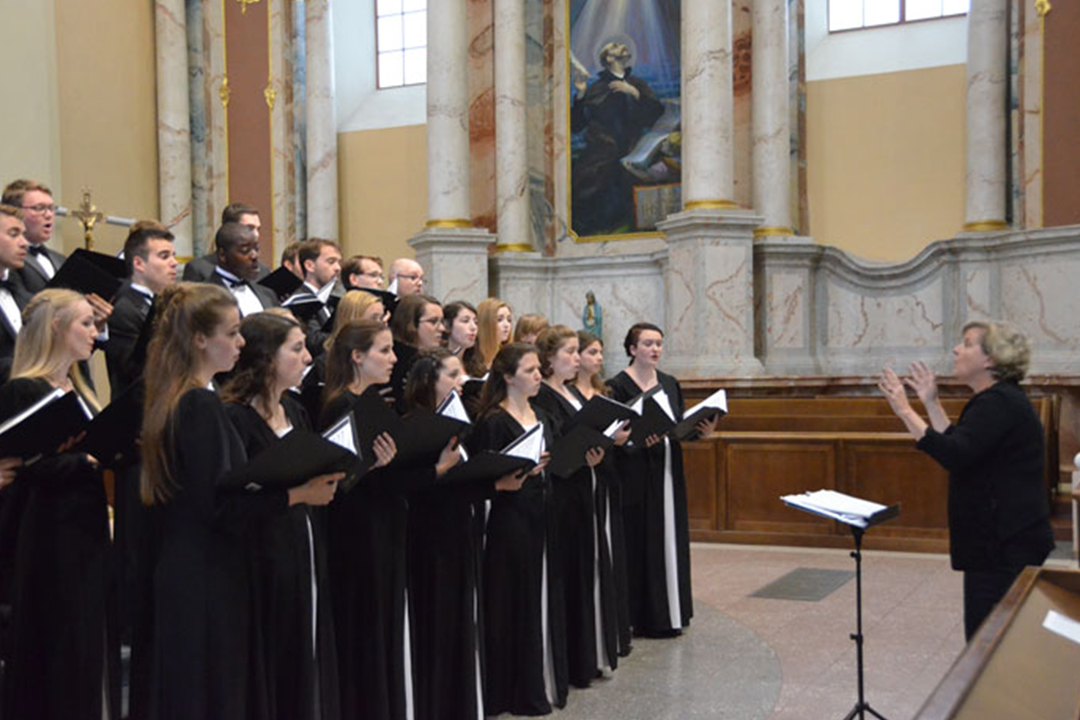By John DiConsiglio
From the churches of Latvia to the castles of Lithuania to the villages and town squares of Estonia, the Baltic States of Northern Europe are renowned for their rich musical tradition. In the streets and concert halls of the three small nations, folk singers pluck ballads on the strings of zithers and classical choirs fill baroque cathedrals with rousing hymns. Dubbed the “Land that Sings,” the region was home to the so-called “Singing Revolution,” where, from 1987 to 1991, hundreds of thousands of Baltic people protested the Soviet occupation by singing banned patriotic anthems.
“These are countries where music matters,” said Robert Baker, assistant professor of music and director of performance study within the Department of Music. “They have preserved their culture and traditions through song.”
This spring, a chorus of 26 GW students added their voices to Baltic harmonies during a 10-day, four-city study abroad tour. Organized every two years by the Department of Music, previous choirs have taken their talents to South Africa, Brazil, Croatia and Italy. They study international musical cultures, sing with local performers and express their thanks to the host countries with service projects, such as instructing school children and staging concerts at orphanages.
“Our students will be better musicians thanks to this trip and they will also be better citizens of the world,” said Baker, one of three faculty members from the Department of Music who accompanied the choir abroad.
The tour is part of the Study Abroad Program, which supported a dozen student trips this spring and summer, including an art therapy excursion to India and an interior architecture and design trek through Paris. With student input, Baker and Gisèle Becker—an adjunct music instructor and director of choral activities—chose the Baltics for its musical heritage as well as its exotic locale. “We wanted to offer [students] a travel experience they may never have considered before,” Becker said.
Students rehearsed throughout the spring semester, spending as much as 10 hours a week crafting their repertoire of spirituals, standards and sing-alongs. “We feel very strongly about bringing American music on international tours; that’s who we represent and that’s what audiences want to hear,” said Kevin Frey, a former president of University Singers who graduated this spring with a BA in journalism and a minor in music. “We think of it as an exchange of international musical genres.” With churches comprising three of four venues on the Baltic tour, the choir deemphasized works by Gershwin and Copeland in favor of choral arrangements and American spirituals.
By the time the choir landed in Lithuania after a 13-hour flight, the jet-lagged singers had just hours to prepare for a concert at the Church of St. Casimir, an historic 15th century cathedral in the capital of Vilnius. The students were less awed by the church’s gold-domed ceiling and 13 ornate baroque alters than by its remarkable acoustics. Singing to an audience of more than 100 fellow performers, students and local music-lovers, their voices echoed for a full seven seconds after each note. “It was beautiful,” said Jennifer Sherman, a junior political science major and soprano with University Singers. “We sounded crazy good.”
For 10 days, the choir held joint concerts with local singers and school choruses. In Riga, Latvia, the students shared the stage with the Latvian Voices, a world famous female a cappella vocal group. In Šiauliai, Lithuania, they visited the Hill of Crosses, a monument of 100,000 crosses memorializing deceased loved ones, including victims of Nazi and Soviet massacres. Sophomore Katie Costello, a GW Troubadour soprano, draped her late grandmother’s rosary around a cross. “She always regretted never traveling the world,” she said. “It was a special moment for me.”
The highlight of the trip was a performance at Keila SOS Children's Village, an orphanage in a remote township outside of Tallinn, Estonia. They distributed clothing, toys and gifts and swapped their hymns for light-hearted pop tunes from the Jackson Five and Young the Giant. At first, Frey said, the audience of “doe-eyed” children seemed intimidated by the boisterous singers. “But we soon had them dancing and imitating boom box beats,” he said. "It was the best concert of our trip," Baker said. "i was wonderful to see the joy on the faces of both the staff and children."
Throughout the trip, the choir endured the inevitable backstage dramas. Rising senior Ally Carter, a geography and international affairs major and GW Troubadour soprano, landed in Lithuania with laryngitis and lip-synced through her first performance. And a stomach bug struck a handful of students in the middle of an Estonian concert. “We were dropping like flies,” Costello joked.
Forced to fill in for ailing soloists, Frey memorized song lyrics just moments before his cue—comforted by the likelihood that few audience members spoke English. “When you are touring, you have to roll with the punches and perform by the seat of your pants,” he said. “It’s part of the fun—even though it’s slightly terrifying.”
While their harmonies may have been tested by two weeks of travel, rehearsals and performances, the singers said they returned to campus on a high note. “Everybody bonded, as friends and as musicians,” Carter said. “The strongest connections I have to the university is through the music department. They are like my family away from home.”
For Baker, a central figure in the Washington-area classical music scene, these tour experiences are an essential component of the learning experience, and he looks forward to continuing their tradition at GW. “Through our travel and study, students expand their world view and cultural perspectives while discovering how we make and share music around the world.”


